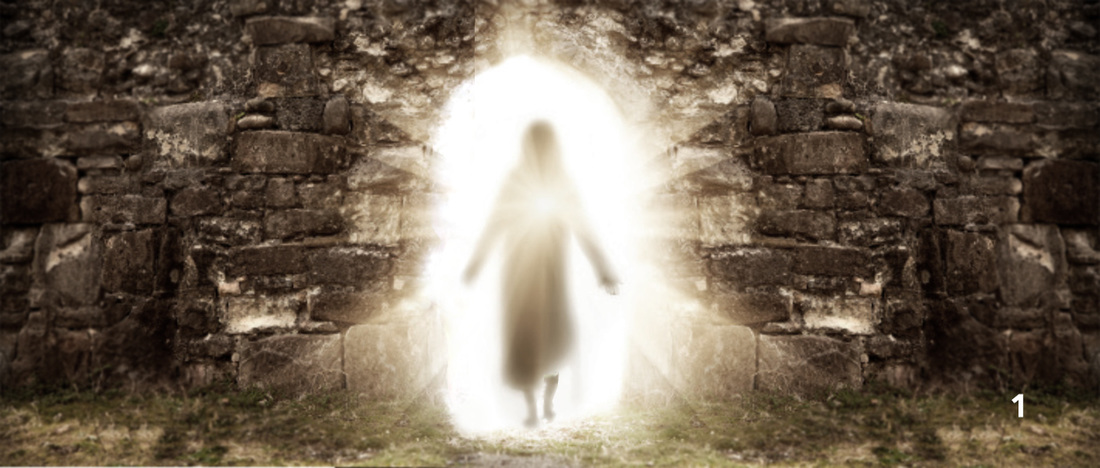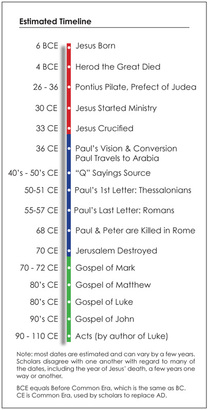“Fourteen years ago I was taken up to heaven for a visit. Don’t ask me whether my body was there or just my spirit, for I don’t know; only God can answer that. But anyway, there I was in paradise, and heard things so astounding that they are beyond a man’s power to describe or put into words (and anyway I am not allowed to tell them to others).” When he describes what he learned of Jesus’ appearance from the early followers in Jerusalem (Peter, James and later, others) he uses some of the same Greek terms to explain the experience, making me think that he, at least, thought that the disciples had the same out of body type of “visionary” experience when they saw Jesus. I conclude from his writings that he knew nothing of a physical appearance of Jesus in the upper room or in Galilee that is described in the later Gospels, yet he got his story about Jesus’ resurrection originally directly from Peter, James, and later from many other of the early followers, so you can't get any closer to the events than that. This is the foundation of Christianity that we are talking about here. If he had been told something different, don’t you thinks that he would have used that information when trying to win over converts? You bet he would have. The story of Jesus' resurrection was very rudimentary and amorphous in the beginning. Mark (the earliest Gospel) doesn’t even mention Jesus’ resurrection! All of the oldest copies of the Gospel end at verse 16:7. Later—much later—a new ending was added that included a resurrection experience. Matthew 28:10 says that Jesus told the women at the tomb to tell his “brothers to leave at once for Galilee, to meet me there.” 28:16 says, “Then the eleven disciples left for Galilee, going to the mountain where Jesus has said they would find him. There they met him and worshiped him—but some of them weren’t sure it really was Jesus!” Luke says that Jesus appeared to two followers on the road away from Jerusalem to nearby Emmaus (although they walked the better part of 7 miles without recognizing him). Later in Jerusalem the two came to tell the other followers what they had seen when “Jesus himself was suddenly standing there among them…” Lastly, John says, “That evening the disciples were meeting behind locked doors, in fear of the Jewish leaders, when suddenly Jesus was standing there among them.” John was written somewhere in the 90’s and probably had copies of one or more of the other Gospels. He also knew that there was a conflict between them, so at the very end of the Gospel he adds, “Jesus appeared again to the disciples beside the Lake of Galilee,” but unlike the account in Matthew, the story now is very detailed, describing exact words of conversations—conversations that 10 or 20 years earlier the author of Matthew knew nothing about, nor did Paul! Nor, evidentially did Peter, James or any of the other original disciples, or they would have told Paul all about it. Can you see how the story seems to grow as the oral tradition progresses through the decades after he died? You might conclude from the above that I don't believe that the resurrection occurred, quite the contrary, I do, but I think that (like Paul) some of them experienced a vision. Perhaps they all had different visions, I don't know. Perhaps some were caused by hysteria and excitement, which can spread in a crowd. All I know is that within a hundred years, the new faith had spread throughout the Roman empire. After starting with a rag-tag bunch of followers, it had grown, morphed and changed beyond anything that the humble Master would have recognized. And, therein lies the problem I have with the church. More with installment 2… |
AuthorArchitect, software CEO, 30-year student of the historical Jesus and early Christianity. Show host of AuthorTalk, interviewing religious and spiritual authors. Archives
May 2017
|

 RSS Feed
RSS Feed


